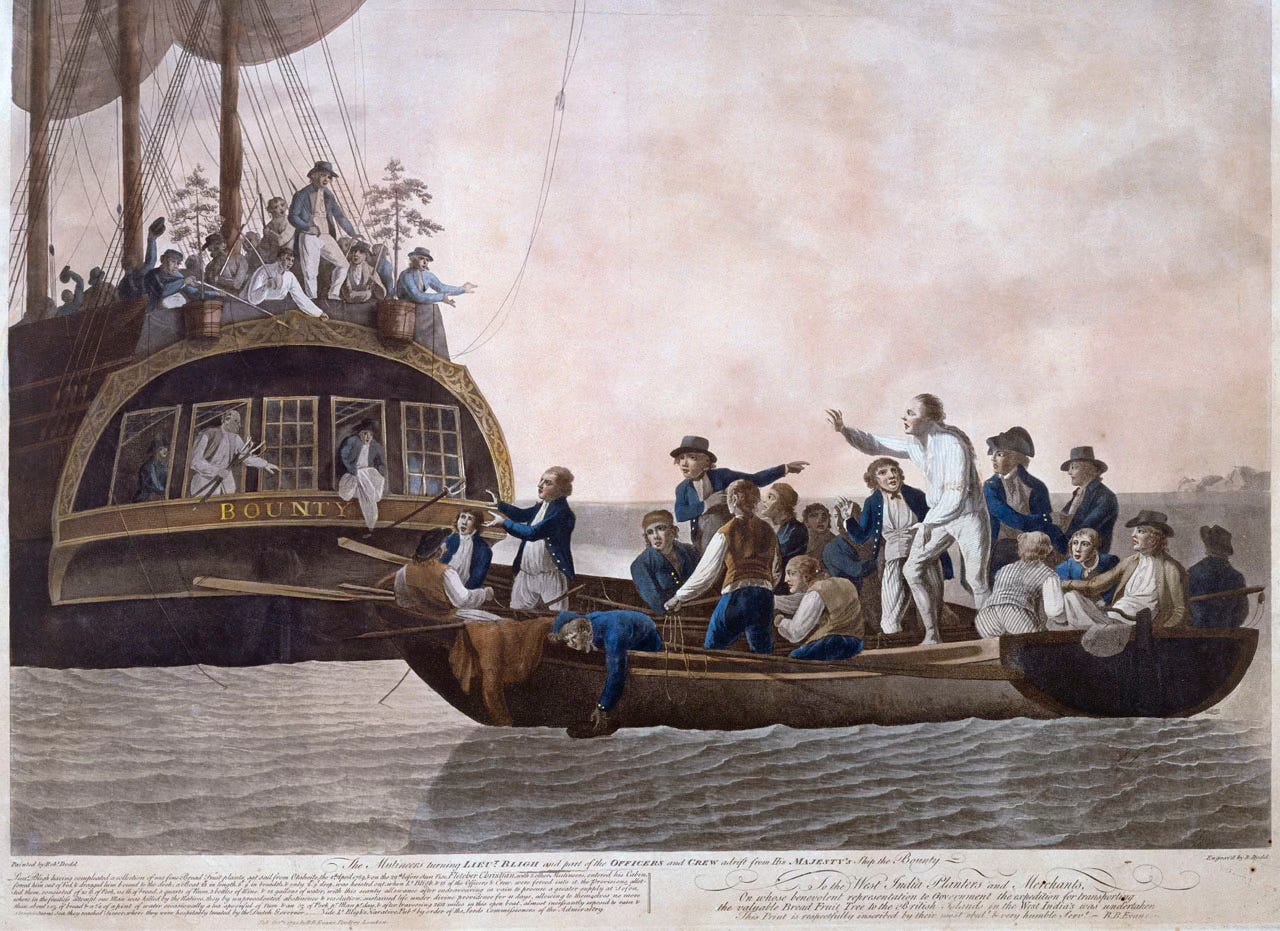
This Day in Legal History: Mutiny on the Bounty
On April 28, 1789, one of the most famous acts of rebellion at sea occurred aboard the HMS Bounty. Captain William Bligh and 18 loyal crew members were forcibly set adrift in the Pacific Ocean by mutineers led by Fletcher Christian. The incident exposed deep tensions over leadership, working conditions, and authority in the Royal Navy. British law at the time treated mutiny as a capital offense, reflecting the critical importance of discipline aboard ships. After the mutiny, an intense search for the culprits began, with some mutineers eventually captured and returned to England to stand trial.
The ensuing court-martial proceedings offered early insight into naval justice and the balancing act between maintaining strict command and recognizing crew grievances. Defendants argued that Bligh’s harsh leadership provoked the uprising, but the Admiralty was unwavering in its stance against insubordination. Of those captured, three were found guilty and hanged, while others were acquitted or pardoned. The legal handling of the mutiny reinforced the severe consequences for undermining maritime authority. It also prompted discussions about humane treatment of sailors, subtly influencing later reforms in naval discipline.
The Mutiny on the Bounty became a lasting symbol in both legal and cultural history, illustrating how law functions as both a tool of control and a response to the realities of human endurance and dissent at sea.
Seven Democratic senators on the U.S. Senate Judiciary Committee have requested information from the Justice Department regarding recent changes within its civil rights division under President Donald Trump’s administration. In a letter sent Friday, they expressed concern over the reassignment of several career officials, suggesting these moves could be an attempt to pressure staff into leaving and shift the division's enforcement priorities. Since Trump’s return to office and the appointment of Pam Bondi as Attorney General, the department has paused investigations into police misconduct, launched a gun rights investigation in Los Angeles, and altered its approach to transgender rights cases. It has also opened investigations into antisemitism related to pro-Palestinian protests at colleges. The senators emphasized the importance of nonpartisan career staff in maintaining the integrity of civil rights enforcement. About a dozen senior attorneys specializing in voting, police, and disability rights were among those reassigned. The Justice Department has not yet commented on the senators' letter.
Democratic senators question US Justice Department on civil rights changes | Reuters
The U.S. Drug Enforcement Administration announced that federal law enforcement agencies raided a nightclub in Colorado Springs, arresting over 100 individuals who were in the U.S. illegally. The operation resulted in 114 arrests out of more than 200 people present at the venue, making it one of the largest immigration-related raids since President Donald Trump’s second term began. Attorney General Pam Bondi stated that the raid also led to the seizure of cocaine, methamphetamine, and "pink cocaine," and two individuals were arrested on outstanding warrants. Bondi mentioned links to gangs like Tren de Aragua and MS-13, although she did not directly confirm whether those arrested were affiliated with them. The DEA noted that occupants were given multiple warnings before the raid was executed. This action is part of an intensifying crackdown on illegal immigration under Trump’s renewed immigration policies. Separately, ICE recently reported nearly 800 immigration-related arrests in Florida during a multi-agency operation.
Over 100 migrants in the US illegally arrested in Colorado nightclub | Reuters
The Supreme Court has requested additional briefing in a case challenging the Affordable Care Act’s mandate that insurers cover preventive services, like cancer screenings, at no cost. The justices specifically want the parties to address whether the Secretary of Health and Human Services has the legal authority to appoint members of the U.S. Preventive Services Task Force, which advises on covered treatments. During arguments on April 21, Justice Neil Gorsuch questioned whether the power to remove officials necessarily implies the power to appoint them, an issue the lower court had not considered. The Fifth Circuit Court of Appeals previously ruled that the task force’s structure violated the Constitution’s appointments clause, arguing its members must be nominated by the president and confirmed by the Senate. The Trump administration contends the task force members are merely "inferior officers" under the HHS Secretary’s control. The case also involves objections by Texas businesses and residents to mandatory coverage of HIV prevention drugs, claiming unconstitutional imposition by unelected officials. Supplemental briefs are due by May 5, and while rare, this is not the first time the Court has asked for more information after oral arguments, as seen in past cases like Zubik v. Burwell and Citizens United v. FEC.
Supreme Court Orders New Briefs After Obamacare Case Argued (1)













Share this post